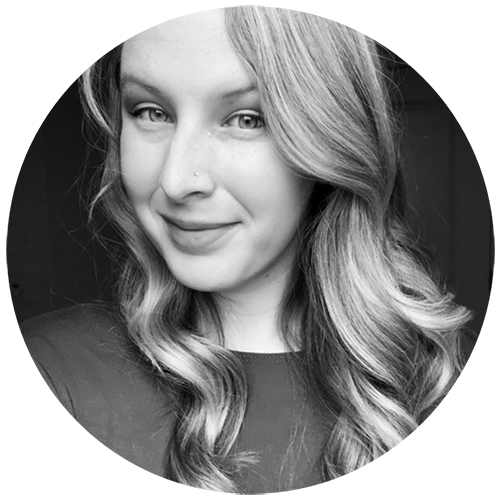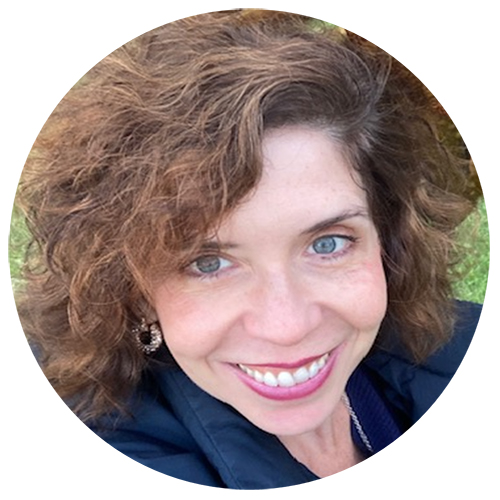
t’s soon to be April, which means National Poetry Month is around the corner. During last year’s National Poetry Month, I was inspired to try writing poems for the first time and signed up for a class that introduced me to a taste; everything from sonnet and villanelle, to haiku and haibun, to sestina and prose poetry. I gravitated to prose poems, given my love for creative nonfiction and memoir writing. But I also found I really enjoyed trying sonnets and villanelles ... and I ended up shocking myself when several of my poems were accepted for publication over the last year. It was an empowering reminder that we all can surprise ourselves when we stretch outside our comfort zones.
I was especially proud of where one of my first prose poems found a home, given this journal’s respected profile of championing beautiful writing and visual art in both print and online for 57 years, and going strong! Please give a warm welcome to our two guests from Welter: Betsy Boyd, Editor-in-Chief and a professor and class advisor to the University of Baltimore MFA students who produce the journal, and Micaela Walley, Poetry Editor. Let’s start by taking a look at Welter’s mission statement:
We’ve been thrashing for 57 years in a city that’s as chaotic, creative, and charming as the words that have graced our pages for decades. We hope the messages and art within Welter serve not only as a beautiful distraction and source of peace during turbulent times but also as a source of inspiration and empowerment. Welter publishes high-quality poetry, fiction, creative nonfiction, and visual art from writers and artists around the world.
The print journal is published each spring, while Welter Online is published in autumn. The reading cycle for the next print issue recently closed on March 9, and submissions for Welter Online will open in early fall—so keep this exciting journal on your radar, readers!
WOW: Welcome, Betsy and Micaela!
Betsy: Thanks, Ann, nice to be here.
Micaela: Hi, Ann!
WOW: With a nod to the upcoming National Poetry Month, let’s start with how the Welter team selects poetry. Micaela, you recently blogged about the process. I was amazed to read that your team received more than 1,000 poetry submissions in your last reading cycle, and accepted only 20! (I was one of those 20: exciting!) As you noted in your post, the pool of submissions was “vast and extraordinary.” I’m sure it’s hard to turn away good work, whether for space reasons or perhaps related to fit with a particular theme. Aside from the tips you shared in the blog, how else do you make those tough choices and narrow the field from that many subs?
Micaela: We had a very diverse group of readers who helped me tackle the submissions pile. Despite all our different poetry preferences, the poems that were the best got high scores from all of us. I like to say that the strongest poems will naturally float to the top of the pool, and they definitely did. While some of us had favorite poems that did not make it to the final rounds of selection, we all agreed that the poems that were chosen were excellent.
WOW: Is that a usual number for each reading period—1,000 or more for poetry? That’s a ton of subs! What stood out for you of the 20 poems chosen for Welter’s Fall 2021 issue?
Micaela: It was more submissions than I’d ever handled before, for sure. I was deeply connected to all the poems we published. I read them so many times at the very end. I think what stood out for me with the poems that were selected was that they all clearly established their own voice, avoided abstractions, and weren’t afraid of including the nitty gritty details of everyday life. I love a poem that doesn’t shy away from specifics, and I think all of the selected poems rose to that challenge.
WOW: Betsy, we’d love to hear what stood out to you in the latest issue, as well—across all genres.
Betsy: We found that COVID brought out the awesome poetry in many talented writers, one of the few positives of this moment in time. The Welter Online issue was terrific across the board in terms of poetry, fiction, nonfiction, and art. Perhaps because more creatives had quiet, meditative time to work, and to be at home, more were in natural submission mode. We’ve seen strong numbers for a while now, but 2021 brought record submissions. I loved all the poems we selected, including your gorgeous piece, but WWJD by Michele Meyer has stayed with me like a song. Funny, mournful, rare.
WOW: Micaela, in celebration of National Poetry Month, what do you think makes poetry poetry? Is it mood? Musicality? Message? What should poems include to make a lasting impression?
Micaela: As a poet and essayist, I always say that I write essays to explain myself and I write poems about that which can’t be explained. Poems are collages of moments, thoughts, sounds, and images that work together to create a vivid, brief experience on the page. Poems make every word, every punctuation mark, count. It’s an extreme showcase of craft and expression. You may not remember the entire poem after you’ve read it, but you remember how it made you feel.
WOW: I love the way you contrast essays to poems. You sum up the differences so well. What’s your favorite poetry form, by the way? And how do you approach writing poems?
Micaela: I’m a free verse gal. The weirder, the better. I want to read poems that let me escape from my mind and experience life through someone else’s. I think poems are a great showcase of how the writer thinks, and what most grabs their attention. When I write poems, I try to be true to my own internal dialogues. I like writing poems that are accessible to other people, but still entirely true to myself.
WOW: I was thrilled when Welter chose my prose poem, Bands of Honey, and I enjoyed taking part in the online reading event that you organized this past December, Betsy. It’s always wonderful to hear writers read their work, and notice where they pause or what they emphasize. It brings an extra layer of meaning to a piece when it’s read. What do you most enjoy about Welter’s reading events?
Betsy: To be able to put a human face and voice with a writer’s name is such a great feeling, a name that means something important to your mind and imagination as a reader. The reading events are always festive and real and just complete celebrations. We’re all in awe of the writing and even the day at hand.

“Poems are collages of moments, thoughts, sounds, and images that work together to create a vivid, brief experience on the page. Poems make every word, every punctuation mark, count. It’s an extreme showcase of craft and expression.” ~ Micaela Walley
WOW: Betsy, what do you love about being a class advisor to the University of Baltimore’s MFA students, and overseeing Welter’s vision? I’m guessing the masthead may change each year or every other year with a new incoming class, is this right? How have you seen incoming editorial teams keep things fresh?
Betsy: I so love the energy. I’ve worked at many magazines, and the publication process is sometimes grueling but always rewarding—however, when you’re making the same book every month, for example, the roles can become stale or at least predictable. In the case of Welter, yes, the masthead is brand new each term. For a couple of years we’ve been running a class called “E-Publishing” as Welter Online. The website is fairly new. We intend to keep it going. The print journal has traditionally been published each spring in a class called “Creating the Journal.” The students come in fresh in each case, and sometimes a tad bit nervous, but they learn fast. They bring passion and focus, the two central requirements for creative editing and idea generation.
WOW: I’m sure the infusion of fresh ideas and approaches with each new class benefits Welter issues. As Editor-in-Chief overseeing all genres, what might you recommend to writers to make their work stand out and be a good fit for Welter?
Betsy: Same advice as I give my writing students: Write as often as you’re able; engage with your work; let your writing evolve; treat it with respect. Welter loves all good writing.

“Our university’s administration believes in our product, believes in the future of academia and art, and we believe for good reason that they will continue to support us. May art live, thrive, and continue to heal us!” ~ Betsy Boyd
WOW: We always like to share with our readers how journals differentiate themselves. What do you each think sets Welter apart from others?
Betsy: Welter is produced by an MFA program (and English undergrad program) that prizes a writing process that is playful, human, literary, and unique.
Micaela: I think Welter truly gives everyone a shot. All the submissions are read with care. Because of how often the staff shifts from semester to semester, you won’t find any two Welter issues that are exactly like each other. It’s an excellent showcase of talent.
WOW: While on the topic of other journals, care to give a shout-out to any you admire?
Micaela: My personal favorites include Hobart, Okay Donkey Magazine, Salt Hill Journal, Parentheses Journal, Bending Genres, Longleaf Review, 8 Poems, JMWW, and so many more. So many lit mags are labors of love, which makes them especially admirable.
Betsy: I’m a big fan of so many.
WOW: Our global situation is framed by an abundance of alarming issues. How does Welter interact with the current times? Does the team, across genres, want to see more work that is “of the moment,” or does unrelated work stand just as much a chance of being published? How do you balance this?
Betsy: We talk about “current” events in class—it’s impossible not to, and extremely important to check in with one another—and I think that we respond to all good work that helps us to understand where we are in time. But we aren’t looking for anything in particular when we sit down to enjoy and assess the work. That openness is important. Because the past couple of years have been, well, what they’ve been, creative work that touches on or conjures the truth of this unprecedented period may rock us harder than an abstract story set in a green park in a vague town in any year, but again, I like to remind students to look for the art. The work that is its own animal.
WOW: I agree with you, Betsy, that good writing helps us understand where we are in a given period of time. It’s needed. That’s why it’s disheartening to read about any literary journal that folds—and lately, it seems there’s been a fair number of these closures making the news. I read a recent CNN article where they describe it as “... lit mags going from being coveted to abandoned.” As a professor and class advisor—and given Welter’s impressive 57-year history—what’s your perspective on this upsetting trend? And do you agree, as the article points out, that this could have a potential upside as it makes space for new online journals to pop up?
Betsy: It’s always sad news when a lit journal folds, and I do think that this current, uncertain landscape (COVID, recovery after terrible POTUS, etc.) makes life for any ambitious young student more harrowing than usual. The media plays into such natural drama in many cases. That spreading stress leads to lower national enrollments and funding, especially in liberal arts settings, and this can lead to compromised arts funding. Look at the recent scare with Conjunctions, that was joyfully/surprisingly averted.
However, so many great journals are going strong after decades and decades. The Iowa Review, for example, now in its 50th year. Welter: 57 years. Our university’s administration believes in our product, believes in the future of academia and art, and we believe for good reason that they will continue to support us. May art live, thrive, and continue to heal us!
WOW: Amen! More so than ever, we need the arts and the wider and crucial perspectives it brings. I also enjoyed seeing that the CNN article called out X-R-A-Y Magazine as a “newer” and promising journal on the scene. I had a great chat last year with X-R-A-Y CNF Editor, Jo Varnish, for our column.
OK, what gives each of you joy as an editor? On the flip side, can you share a challenge?
Micaela: I love it when we publish writers who are brand new, or still emerging. Giving them that assurance they need to keep writing really feels good, because as a writer, I know how much an acceptance means toward generating even more work. Alternatively, it’s a challenge to say no to so many. I have also been on that end, and as much as it sucks to get a rejection, it’s important to remember that it’s not a “No, forever.” It’s just a “No, not right now.”
Betsy: The number of submissions! The saying no. In combination.
WOW: Not “No, forever,” just “No, not right now.” Micaela, that’s such an important reminder for all of us who deal with our fair share of passes on submissions. By the way, what can our readers expect for an average response time from Welter?
Betsy: Right now, about two months max for online. For print, because of the way the semester schedule rolls out, six to eight weeks.
WOW: We like to turn the tables in these interviews and hear more about what our guests pursue with personal writing and other literary interests. Let’s start with each of your first publications, which is a big milestone for any writer. Where was it published and what made it especially memorable?
Micaela: My first published poem was written about my mom in 2016! I See My Mother was published by Eunoia Review.
Betsy: My first published story is not online, but it was in a university magazine, Clerestory at Brown University. Cool to see the connection here! Here’s my latest publication, Adult Swim, at Kenyon Review.
WOW: Such a deeply personal and moving poem, Micaela. To your earlier point, you bring together moments, sounds, tastes, and images to create a vivid experience on the page. And Betsy, I found the audio recording for your piece in the Kenyon Review and thought our readers would enjoy listening to your reading, so I dropped that link above.
A final question on the almost eve of National Poetry Month: People sometimes joke that with poets there’s a lot of gazing involved. At clouds. At flowers. There’s deep thinking. Maybe some doodling in the margins. I say this with a wink, but also with true admiration for what poets do. What do you think poets bring to the world, to help us understand it better?
Micaela: Poets are attuned to the little things as well as the big things. They notice details that wouldn’t otherwise be mentioned in other genres. They offer us the ability to see through another set of eyes. And they work within brevity—making it easy to pull out and read again. They help us to see what would otherwise be ignored.
My thanks to Betsy Boyd, Welter’s Editor-in-Chief, and Micaela Walley, Poetry Editor, for chatting with me. As a reminder, submissions for Welter Online will open again in the autumn of 2022. That gives all of you a full spring and summer to polish your poetry, prose, or visual art selections in between your barbeques and beachgoing!
To our audience of poets, we hope this upcoming month of celebrating poetry is full of wonderful work that you’ll read—and write. For our fiction and nonfiction audience, we wish you a productive month, as well. Until next time!

Ann Kathryn Kelly writes from New Hampshire’s Seacoast region. She’s an editor with Barren Magazine, a columnist with WOW! Women on Writing, and she works in the technology sector. Ann leads writing workshops for a nonprofit that offers therapeutic arts programming to people living with brain injury. Her essays have appeared in a number of literary journals.
https://annkkelly.com/.